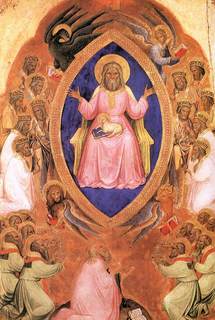Et Ecce Ostium Apertum in Caelo
Thirty–Third Wednesday of the Year II
 Memorial of Saint Cecilia, Virgin and Martyr
Memorial of Saint Cecilia, Virgin and Martyr
Revelation 4:1–11
Psalm 150:1–2, 3–4, 5–6 (Rev 4:8b)
Luke 19:11–28
Heaven’s Open Door
Saint John says, “I, John, looked, and behold, in heaven, an open door” (Ap 4:1). The image of the open door in heaven is a fascinating one. Everyone, after all, is curious about what lies beyond the door of heaven. Everyone wants to catch a glimpse of what goes on in paradise. Countless saints and mystics, beginning with Saint Stephen the Protomartyr, have been allowed to look through heaven’s open door.
Sine Fine Dicentes
John hears a trumpet–like voice inviting him to come up, and in the twinkling of an eye, finds himself in the Spirit standing before the very throne of God and the whole heavenly court. All around the throne of God he sees fantastic creatures “full of eyes all round and within, and day and night they never cease to sing” (Ap 4:8). It is this one phrase that makes today’s First Reading so suitable for the feast of Saint Cecilia: “they never cease to sing” (Ap 4:8). It is this phrase that the Church enshrines in the Preface of the Mass where she describes the hosts of heaven as sine fine dicentes, ceaselessly singing.
The Vicar of Hodnet and His Hymn
And what are the hosts of heaven singing? “Holy, holy, holy. Lord God Almighty, who was, and who is, and who is to come” (Ap 4:8). In 1826, a clergyman of the Church of England named Reginald Heber, the Vicar of Hodnet in Shropshire, wrote a hymn inspired by this text for Trinity Sunday. Another Anglican clergyman composed the tune for it. With the expansion of the British Empire the hymn spread to every corner of the English–speaking world. Heber himself died as bishop of Calcutta in 1826.
Holy, holy, holy! Lord God Almighty!
Early in the morning our song shall rise to thee.
Holy, holy, holy! Merciful and mighty,
God in three Persons, blessèd Trinity.
Holy, holy, holy! All saints adore thee,
casting down their golden crowns around the glassy sea;
cherubim and seraphim falling down before thee,
which wert, and art, and evermore shalt be.
Holy, holy, holy! Though the darkness hide thee,
though the sinful human eye thy glory may not see,
only thou art holy; there is none beside thee,
perfect in power, in love, and purity.
Holy, holy, holy! Lord God Almighty!
All thy works shall praise thy Name, in earth, and sky, and sea;
Holy, holy, holy! Merciful and mighty,
God in three Persons, blessèd Trinity.
Canterbury in Rome
It is fitting that we should recall an Anglican hymn today. The Anglican Archbishop of Canterbury Rowan Williams is in Rome. Last evening he gave an address at the Benedictine College of Sant’Anselmo. His theme? The Rule of Saint Benedict. His argument? That the Rule of Saint Benedict is the answer to the problems of contemporary Europe. A British newspaper reporting on the Archbishop’s address had an extraordinary headline this morning. “Could you live by Saint Benedict’s Rule?”
Rome’s Wayward Daughter
This morning the Archbishop of Canterbury met with the Holy Father and joined him in prayer. They will, without a doubt, have discussed those distressing developments in the Anglican Communion that have widened the gap between Rome and Canterbury. This is particularly poignant given that the Church of Canterbury was founded from Rome when Pope Saint Gregory sent Saint Augustine and forty other Benedictine monks to England in the year 597. The Church in England is the daughter of the Church of Rome. This no one can deny.
When Saint Augustine and his companions arrived in Kent, they brought with them the sacred liturgy of Rome. They offered Holy Mass exactly as it was offered in Rome, using books and relics brought from the Eternal City. In the very first Mass celebrated on English soil, using the venerable Roman Canon, they commemorated Saint Cecilia. We do well to seek her intercession today for Rome’s wayward and alienated daughters, the ecclesial communities of the Anglican Communion. May they find the open door and not shrink from it.
